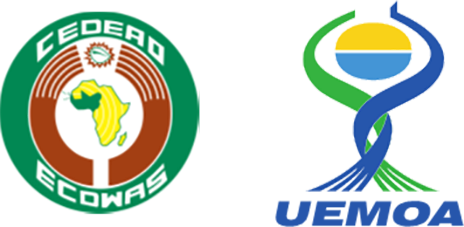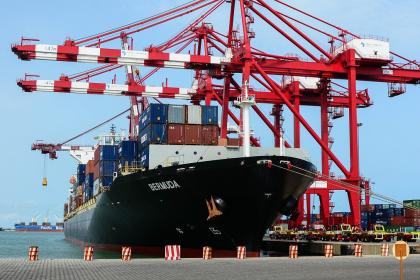Established in 1975, the Economic Community of West African States (ECOWAS) treaty aims at reducing or eliminating the quantitative and administrative restrictions on trade among members. The main achievements in trade facilitation are the establishment of the Economic Trade Liberalization Scheme (ETLS) (1983), the Common External tariff (CET) (2013) and the Joint Border Post (JBPs) Programme, launched in 2003 with a Decision (A/DEC/13/01/03) requiring ECOWAS Member States to establish Joint Border Posts. However, traders in ECOWAS Member States still face complex and uncoordinated procedures, as well as the disconnection between clearance systems and a widespread informal sector, which weakens trade competitiveness and revenue collection.
To improve the free and efficient movement of goods, the Trade Facilitation West Africa (TFWA) Program supports ECOWAS Member States in reducing the time and cost of trade borne by the private sector in West Africa and strengthens regional trading networks. It is a five-year initiative co-implemented by the World Bank Group and the German Development Cooperation Agency (GIZ), and overseen by a steering committee chaired by the ECOWAS Commission and supported by the UEMOA Commission as deputy chair.
The TFWA Program's first component focuses on improving regional trade facilitation measures. To this end, Component 1 includes capacity building to strengthen the ECOWAS and UEMOA Commissions' ability to carry out regional policy dialogue effectively, design regional trade facilitation policies, and monitor these policies at national and regional levels. Thus, the TFWA Program is giving special attention to strengthening the National Trade Facilitation Committees (NTFCs)' capacities and efficiency.
To achieve the aim, UNCTAD will contribute to implementing a capacity-building project for the ECOWAS NTFCs under the TFWA Program. The Project seeks to strengthen the roles and capacities of NTFCs as influential coordinating entities of trade facilitation reforms through an e-learning course. UNCTAD's technical assistance will complement the TFWA Program’s multifaceted trade facilitation support initiative. Its delivery will be done in close collaboration with the TFWA Program, the ECOWAS Commission and ECOWAS Member States to build a consistent foundational capacity in the 15 ECOWAS Member States and the ECOWAS Commission.
Objective of the Project:
The Project aims to strengthen the roles and capacities of the National Trade Facilitation Committees (NTFCs) as effective coordinating entities of trade facilitation reforms through an online capacity-building programme. Thereby, UNCTAD will assist the TFWA Program in the implementation of trade facilitation reforms by contributing to training NTFCs as the lead agents of change.
Activities:
The Project will include both national and regional activities. The national activities include:
- Launch ceremonies. A launch event will be organized in each ECOWAS Member State to present the e-learning platform and the course content and to agree with the interested parties on the specific timeline of the e-learning modules.
- E-Learning modules. Ten modules delivered through the UNCTAD Trade Facilitation e-Learning platform will provide policymakers and NTFC members with the fundamental concepts of trade facilitation needed to perform their duties. Each module comprises videos, quizzes, a final exam, and further reading. A webinar with experts will complement each module.
- Closing Ceremonies. A hybrid closing event will be organized with course results and to distribute certificates.
Regional activities include two webinars about opportunities for implementing regional trade facilitation instruments to support intra-regional integration. A specific course environment will be created to gather all information on the two regional webinars, allowing all national and regional participants and project partners to interact through the platform.
Intended Outcomes:
Functioning and sustainable NTFCs provide the necessary multi-stakeholder consultative mechanism for Trade Facilitation oversight and reform, per the WTO Trade Facilitation Agreement.
Link to the SDGs:
The present Project will include the SDGs dimensions as regards strengthening policy frameworks and institutions, which correspond to the Sustainable Development Goal (SDG) 10 – Reduced Inequalities – and more concretely to Target 10.6: "Ensure enhanced representation and voice for developing countries in decision-making in global international economic and financial institutions to deliver more effective, credible, accountable and legitimate institutions". Indirectly, this Project will also contribute to achieving SDGs 1 (No Poverty), 8 (Decent Work and Economic Growth), 9 (Industry, Innovation, and Infrastructure), 16 (promote peaceful and inclusive societies for sustainable development) and17 (Partnerships for the Goals).
Monitoring and Evaluation:
The team will use the logical framework achievement indicators, developed according to UNCTAD internal Result Based Management requirements, to monitor project results during the project implementation period and beyond.






